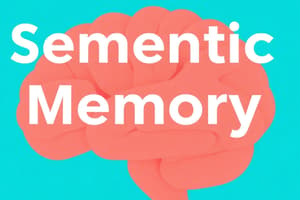Podcast
Questions and Answers
Which of the following best describes antonyms?
Which of the following best describes antonyms?
- Words that have opposite meanings (correct)
- Words with similar meanings
- Words that are used together in a sentence
- Words that are difficult to understand
In the sentence 'It's hot outside' and 'It's cold inside,' 'hot' and 'cold' are used as:
In the sentence 'It's hot outside' and 'It's cold inside,' 'hot' and 'cold' are used as:
- Homonyms
- Antonyms (correct)
- Synonyms
- Homophones
Why are antonyms essential in language?
Why are antonyms essential in language?
- They create ambiguity
- They have similar meanings
- They make sentences longer
- They help to avoid confusion (correct)
Which of the following pairs best represents antonyms?
Which of the following pairs best represents antonyms?
What is the role of antonyms in creating contrast?
What is the role of antonyms in creating contrast?
Which of the following is NOT an example of antonyms?
Which of the following is NOT an example of antonyms?
What is the role of antonyms in literature?
What is the role of antonyms in literature?
How do antonyms contribute to communication?
How do antonyms contribute to communication?
What does the evolution of meaning result in?
What does the evolution of meaning result in?
How do antonyms contribute to storytelling?
How do antonyms contribute to storytelling?
What is the significance of antonyms in semantic lexical relations?
What is the significance of antonyms in semantic lexical relations?
How do antonyms evolve over time?
How do antonyms evolve over time?
What is the impact of antonyms on word meanings?
What is the impact of antonyms on word meanings?
How do antonyms contribute to the creation of vivid imagery?
How do antonyms contribute to the creation of vivid imagery?
What is the impact of antonym evolution on language and culture?
What is the impact of antonym evolution on language and culture?
What is an example of the role of antonyms in storytelling?
What is an example of the role of antonyms in storytelling?
Study Notes
Semantic Lexical Relation: Understanding Anonymyms
Lexical relations, such as antonyms, play a crucial role in understanding the meaning of words and how they are related to one another. In semantics, antonyms are word pairs that have opposite meanings, creating a contrast between the two words. In this article, we will delve into the concept of antonyms and their significance in the realm of semantic lexical relations.
What are Antonyms?
Antonyms are words that have opposite meanings, such as "hot" and "cold," "large" and "small," or "dark" and "light". These word pairs are called antonyms because they are opposite in meaning and can be used to contrast or complement each other in a sentence. For example:
- "Hot" and "cold" can be used to describe temperature, as in "It's hot outside" and "It's cold inside."
- "Large" and "small" can be used to describe size, as in "The elephant is large" and "The mouse is small."
- "Dark" and "light" can be used to describe brightness, as in "The room is dark" and "The room is light."
The Importance of Antonyms
Antonyms are essential in language because they help to clarify and expand the meaning of words. They allow for more precise communication and can help to avoid confusion when using words with similar meanings. For instance, if someone says "I'm feeling hot," it could be interpreted as "I'm feeling good" or "I'm feeling angry." However, if they clarify that they feel "hot and tired," it becomes clear that they are feeling fatigued.
Antonyms also play a crucial role in storytelling, as they help to create vivid and engaging descriptions. For example, a sentence like "The sun was setting, casting a warm glow over the landscape" creates a vivid image in the reader's mind using antonyms like "warm" and "glow" in contrast to "cool" and "dark".
How Antonyms Evolve
Antonyms often evolve over time, as words change meaning and their usage shifts in various contexts. For example, the word "nice" originally meant "foolish" or "silly" in the 15th century, and it wasn't until the 18th century that it began to take on its current meaning of "pleasant" or "agreeable". This evolution of meaning has resulted in the creation of new antonyms, such as "virtual" and "tangible" in the context of technology.
The Role of Antonyms in Literature
In literature, antonyms are used to create tension and contrast between characters, settings, or themes. For instance, in C.S. Lewis' "The Lion, the Witch, and the Wardrobe," the characters Edmund and Peter are antonyms, with Edmund representing temptation and selfishness, while Peter represents loyalty and bravery.
Conclusion
Antonyms are an integral part of semantic lexical relations, as they help to clarify, expand, and contrast word meanings. They play a crucial role in communication, storytelling, and literature, and their evolution over time has led to the creation of new antonyms that reflect changes in language and culture. Understanding the significance of antonyms can enhance our appreciation for the richness and complexity of language and its ability to convey meaning and emotion.
Studying That Suits You
Use AI to generate personalized quizzes and flashcards to suit your learning preferences.
Description
Explore the concept of antonyms, their role in creating contrasts and clarifying word meanings, and their evolution over time. Discover how antonyms are crucial in language, communication, storytelling, and literature, shaping our understanding of word meanings and enriching communication.




